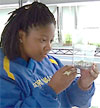Of 130+ applicants, 25 undergraduates receive awards to pursue research
Karen AdamsPULLMAN, Wash. – Twenty-five students from a record pool of applicants for Washington State University awards in undergraduate research, scholarship and creative activities will each receive $1,000 to support their work.
Zachary Reeves, a freshman in electrical engineering mentored by Amit Dhingra is among the award recipients. He will research custom algorithms to execute programs and analyze data in the genomics and biotechnology lab.
Read the article at WSU News.

